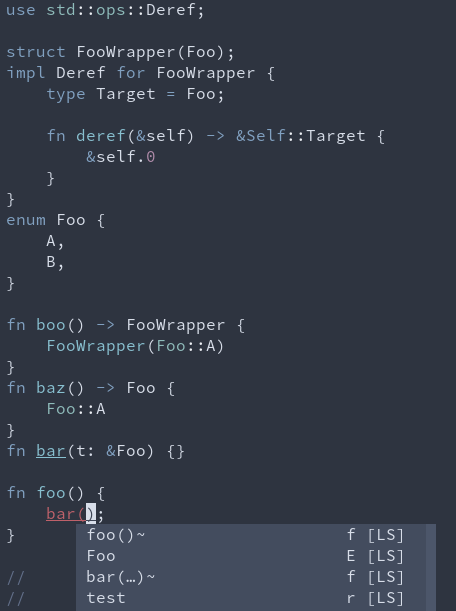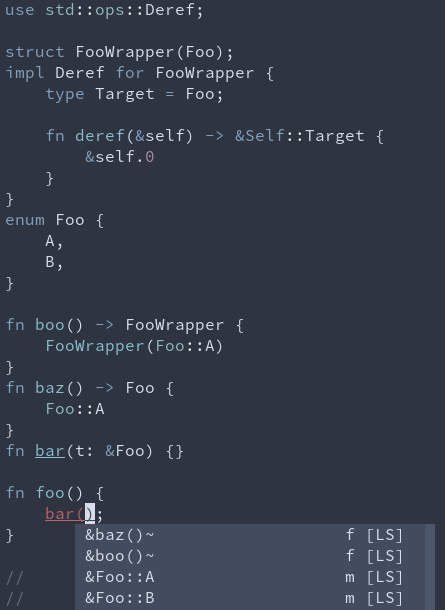8063: couple clippy::complexity fixes r=matklad a=matthiaskrgr
avoid redundant `.into()` calls to convert T into identical T (`let x: String = String::from("hello").into();`)
use `if let Some(x)` instead of `.is_some()` + `.unwrap()`
don't clone Copy types
remove redundant wrapped ?s: `Some(Some(3)?)` can just be `Some(3)`
use `.map(|x| y)` instead of `and_then(|x| Some(y)` on `Option`s
Co-authored-by: Matthias Krüger <matthias.krueger@famsik.de>
8042: Add perf_revision to benchmark results r=lnicola a=d2weber
I gave it a try to add the hash as described in #8031
Feel free to tell me if there is something I could improve.
Co-authored-by: Douglas Weber <douglas.web@web.de>
8052: minor style fixes per feedback on #8036 r=JoshMcguigan a=JoshMcguigan
cc @matklad - this PR addresses your comments in #8036.
changelog fixup #8036
Co-authored-by: Josh Mcguigan <joshmcg88@gmail.com>
7900: show function params in completion detail r=matklad a=JoshMcguigan
This resolves#7842 by updating the detail for function completions from `-> T` to `fn(T, U) -> V`. I added an expicit unit test for this, `ide_completion::render::fn_detail_includes_args_and_return_type`, which passes.
Lots of other unit tests fail (~60 of them) due to this change, although I believe the failures are purely cosmetic (they were testing the exact format of this output). I'm happy to go update those tests, but before I do that I'd like to make sure this is in fact the format we want for the detail?
edit - I realized `UPDATE_EXPECT=1 cargo test` automatically updates `expect!` tests. Big 👍 to whoever worked on that! So I'll go ahead and update all these tests soon. But I still would like to confirm `fn(T, U) -> V` is the desired content in the `detail` field.
8000: Use hir formatter for hover text r=matklad a=oxalica
Fix#2765 , (should) fix#4665
Co-authored-by: Josh Mcguigan <joshmcg88@gmail.com>
Co-authored-by: oxalica <oxalicc@pm.me>
8036: completions: provide relevance bonus for enum types, and suggest ref matches for fn and enum r=matklad a=JoshMcguigan
This PR makes several improvements to completions and completion sorting:
1. Provide exact match type relevance score bonus for enum variants
2. Suggest `&Foo` (ref_match) for enums if that is an exact type match
3. Suggest `&foo()` (ref_match) if `foo` returns a type which would be an exact match either with the reference or due to a `Deref` impl
### Before

### After

### Caveats
I think generic types will require some kind of fancier logic when testing for `exact_type_match`, so for now `Option`/`Result`/etc unfortunately still don't have great completions.
### Implementation
I implemented this in a way that I think makes it most likely for each completion type to be handled consistently. Just replace `CompletionItem::new` with `CompletionItem::new_with_type_info` and `exact_type_match`/`exact_name_match`/`ref_match` are all handled for you, in a way which is sure to be consistent across completion types.
This approach does introduce some coupling/plumbing that didn't exist before. Notice for example `set_is_local` on the builder, because `set_relevance` was removed from the builder to enforce that the relevance was built "properly" with `CompletionItem::new_with_type_info`. But I think there are benefits to this approach, like `CompletionRelevance` should probably consider deprecation status, and we already tell the builder about that, so in the (likely near term) future we can just pass that information along to `CompletionRelevance` when the user calls `set_deprecated` rather than the user having to manually set it in two places. This basically just hides `CompletionRelevance` from the individual completions, so they only worry about the `CompletionItem` interface. At the moment this seems like a cleaner approach to me, but I'm open to feedback here.
edit - I've reimplemented this in a simpler way, per feedback below.
8046: Prefer match to if let else r=matklad a=matklad
bors r+
🤖
Co-authored-by: Josh Mcguigan <joshmcg88@gmail.com>
Co-authored-by: Aleksey Kladov <aleksey.kladov@gmail.com>
8044: Fix macro expansion for statements w/o semicolon r=edwin0cheng a=edwin0cheng
Fixes #7845
And up `ungrammer` to 1.12.
cc @jonas-schievink
bors r+
Co-authored-by: Edwin Cheng <edwin0cheng@gmail.com>
8039: Use SmallVec for Substs r=flodiebold a=flodiebold
Doesn't help as much as I hoped, but it helps a bit and I also did some
refactorings that were necessary anyway.
Co-authored-by: Florian Diebold <flodiebold@gmail.com>
7970: Fix incorrect diagnostics for failing built in macros r=jonas-schievink a=brandondong
**Reproduction:**
1. Use a built in macro in such a way that rust-analyzer fails to expand it. For example:
**lib.rs**
```
include!("<valid file but without a .rs extension so it is not indexed by rust-analyzer>");
```
2. rust-analyzer highlights the macro call and says the macro itself cannot be resolved even though include! is in the standard library (unresolved-macro-call diagnostic).
3. No macro-error diagnostic is raised.
**Root cause for incorrect unresolved-macro-call diagnostic:**
1. collector:collect_macro_call is able to resolve include! in legacy scope but the expansion fails. Therefore, it's pushed into unexpanded_macros to be retried with module scope.
2. include! fails at the resolution step in collector:resolve_macros now that it's using module scope. Therefore, it's retained in unexpanded_macros.
3. Finally, collector:finish tries resolving the remaining unexpanded macros but only with module scope. include! again fails at the resolution step so a diagnostic is created.
**Root cause for missing macro-error diagnostic:**
1. In collector:resolve_macros, directive.legacy is None since eager expansion failed in collector:collect_macro_call. The macro_call_as_call_id fails to resolve since we're retrying in module scope. Therefore, collect_macro_expansion is not called for the macro and no macro-error diagnostic is generated.
**Fix:**
- In collector:collect_macro_call, do not add failing built-in macros to the unexpanded_macros list and immediately raise the macro-error diagnostic. This is in contrast to lazy macros which are resolved in collector::resolve_macros and later expanded in collect_macro_expansion where a macro-error diagnostic may be raised.
Co-authored-by: Brandon <brandondong604@hotmail.com>
Co-authored-by: brandondong <brandondong604@hotmail.com>